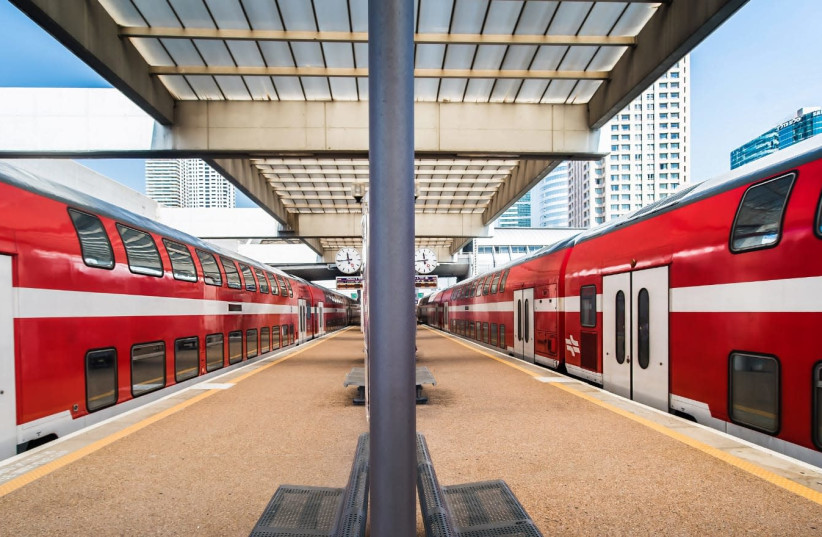Israel needs to fix its existing train lines before making new ones
Big dreams are great – so long as practical details aren’t ignored along the way.
On Sunday, Prime Minister Benjamin Netanyahu unveiled a big dream: a fast train linking Kiryat Shmona to Eilat, set to be completed around 2040 at an estimated cost of NIS 100 billion.
“Today we are launching the ‘One Israel’ project – connecting the entire country by high-speed train,” he said, adding that the idea is that no locale in the state will be more than two hours from the country’s center.
The rationale for building such a train is compelling. It will link the periphery to the center, making it feasible to live in distant Dimona and work in Tel Aviv, or reside in remote Kiryat Shmona and operate a business in Jerusalem. This could help ease housing prices by encouraging people to move outside the country’s economic heartland – between Gadera and Hadera – while continuing to work there.
Moreover, such a railway dovetails perfectly with talk – hypothetical, at this time – of a future peace agreement with Saudi Arabia. If there is peace with Saudi Arabia, and if this train is built – two major “if”s – then goods from the Persian Gulf could make their way through Saudi Arabia to Eilat, be loaded on freight trains there, shipped to one of Israel’s Mediterranean ports, and from there to Europe.
 Israel Railways trains (credit: ISRAEL RAILWAYS)
Israel Railways trains (credit: ISRAEL RAILWAYS)It’s a wonderful dream, but it is still a dream – and not an original one, at that. In February 2012, a previous Netanyahu government – with much fanfare and an eye toward Chinese investment and involvement – approved a plan to build a Red-Med train linking Eilat to Tel Aviv. That plan remained on the drawing board.
And as nice a dream as it is, before pumping tens of billions of shekels into such an ambitious infrastructure project, it might be worth improving the country’s existing transportation infrastructure and making existing train lines more efficient, accessible, and user-friendly.
Israel’s train lines need a lot of work
Take the Jerusalem-Tel Aviv train, for example. The new line has revolutionized the ride between the two cities, a journey that in the past could easily take 75 minutes or longer, but now only takes about half an hour.
That is, of course, if you live next to the Jerusalem train station. If you don’t live nearby, and if you don’t live in one of the neighborhoods serviced by Jerusalem’s light rail, then the train station is difficult to access because there is no place to park in the area. Who builds a train station without affordable parking in close proximity? We do, it seems.
Or consider the train’s frequency. When it was first launched, we were told that four trains would go in each direction every hour. In practice, only two do, apparently due to congestion in the rail segment that passes through Tel Aviv. As a result, the less-frequent trains are often filled to capacity, forcing passengers to stand the entire journey – or wait until the next train. There are plans to build an additional railway passing through Tel Aviv and another that will bypass the city altogether, but they will take years to come to fruition.
Finally, unlike in other OECD countries, Israeli trains bizarrely do not offer Wi-Fi and often pass through areas with poor cellular coverage, making for a frustrating travel experience.
These are just a few of the hundreds of examples of shortsighted planning that make it difficult to use some of the state-of-the-art infrastructure built here in recent years.
Before taking on as ambitious a project as a fast train from Kiryat Shmona to Eilat, the government should prioritize upgrading existing infrastructure – expanding the number of rail lines and coaches to reduce overcrowding, providing adequate parking at train stations, and improving the passenger experience. There is also a pressing need to improve the efficiency and reliability of public buses, especially in areas outside large cities.
In a press conference announcing the fast-train project, which Netanyahu said will provide infrastructure to the Negev that will bring people in its wake, the prime minister stated: “Without infrastructure, there is nothing.”
He is correct. But if existing infrastructure is not adapted to the public’s needs, it cannot possibly live up to its full potential.





Comments are closed.